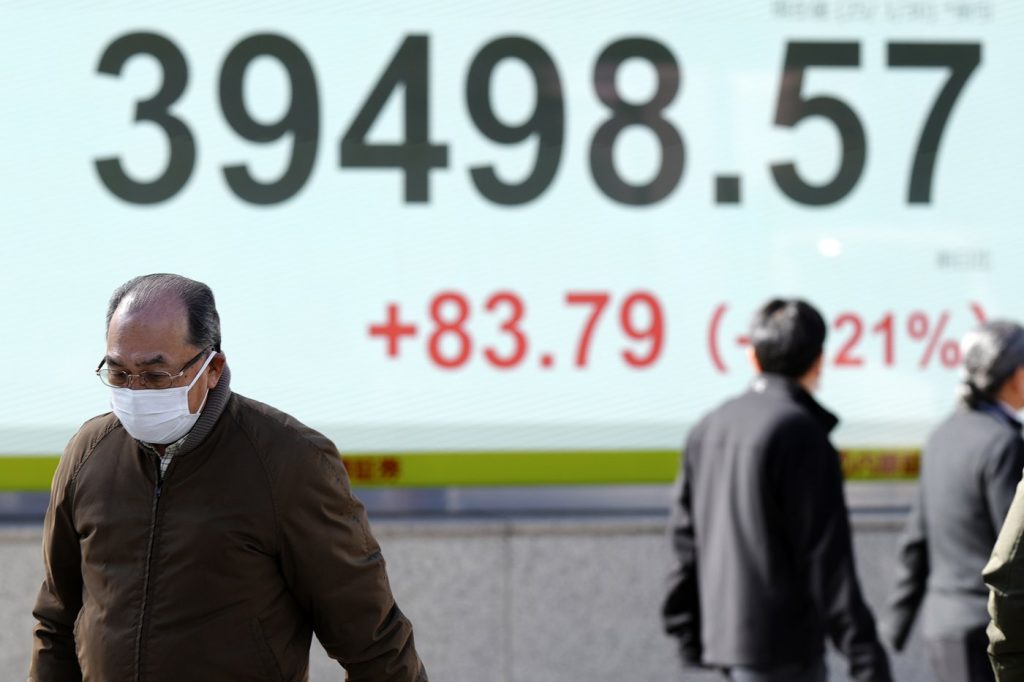Asian shares experienced a mostly positive trend on Thursday following the U.S. Federal Reserve's decision to maintain interest rates for the first time since initiating rate cuts in September aimed at supporting the economy. While some Asia-Pacific markets remained closed due to the Lunar New Year holiday, investor sentiment continued to waver amid uncertainties surrounding the U.S. economic outlook and the actions of the Trump administration.
In Japan, the benchmark Nikkei 225 index saw an uptick of 0.4%, closing at 39,570.73. Australia's S&P/ASX 200 also rose by 0.7%, ending the day at 8,508.30. SoftBank Group's stock declined by 1% amid reports of potential investments in OpenAI, while shares of Nissan Motor experienced a gain of 2.2% after the company confirmed plans to scale back its U.S. production.
The mood on Wall Street portrayed a different picture, with the S&P 500 falling by 0.5% to 6,039.31 after the Fed's anticipated decision. The Dow Jones Industrial Average recorded a slight drop of 0.3%, settling at 44,713.52, while the Nasdaq composite similarly dipped by 0.5%, closing at 19,632.32. The Fed's recent choices suggest that interest rates may remain stable for some time after a steep decline at the end of 2024. Lower rates generally encourage borrowing among U.S. households and businesses, but they can also lead to increased inflation.
The yield on the 10-year Treasury remained at 4.53%, mirroring its late Tuesday position. Fed Chair Jerome Powell indicated that the central bank might lower rates if inflation shows further signs of slowing or if there were sudden weaknesses in the job market. However, he expressed confidence in current economic conditions, stating, "we don’t see that, and we see things as in a really good place for policy and for the economy." This insight implies that a rush to cut rates is not anticipated, as a robust economy coupled with a strong labor market could suggest promising corporate earnings growth.
Recent market dynamics offered a sense of calm, contrasting with previous disruptions fueled by skepticism surrounding the burgeoning artificial-intelligence sector. A Chinese company, DeepSeek, has raised important questions within the AI industry by claiming to have developed a large-language model capable of competing with top global technologies without relying on premium computational hardware. This assertion has fueled discussions regarding the financial implications of AI development, particularly concerning the capital investments in data centers, chips, and power usage that are typically associated with the industry.
Nvidia, a company that has become emblematic of the AI boom, experienced a notable decline, dropping 4% on Wednesday after a volatile week that included a nearly 17% plunge on Monday followed by a near 9% rise the following day. This fluctuation contributed significantly to the downward pressure on the S&P 500. The strong performances of Nvidia and other major tech firms have been pivotal to the S&P 500 achieving back-to-back yearly returns exceeding 20%, a feat not accomplished since before the year 2000. Nvidia alone contributed to more than 20% of the S&P 500's total return for the previous year.
In other notable stock movements on Wall Street, Starbucks rallied by 8.1% as it reported a better-than-expected profit for the last quarter. T-Mobile US also surged by 6.3%, surpassing Wall Street's profit and revenue expectations for the last three months of 2024, while looking forward to adding between 5.5 million and 6 million net postpaid customers throughout the year. Trump Media & Technology Group saw an increase as well, gaining traction from its announcement to venture into financial services through a partnership with Charles Schwab.
In commodity markets, benchmark U.S. crude prices saw a minor increase, rising by 4 cents to $72.66 a barrel, while Brent crude, the international benchmark, fell by 5 cents to $76.56. The foreign exchange market showed the U.S. dollar trading at 154.52 Japanese yen, down from 155.24 yen, while the euro saw a slight rise to $1.0426 from $1.0423.










